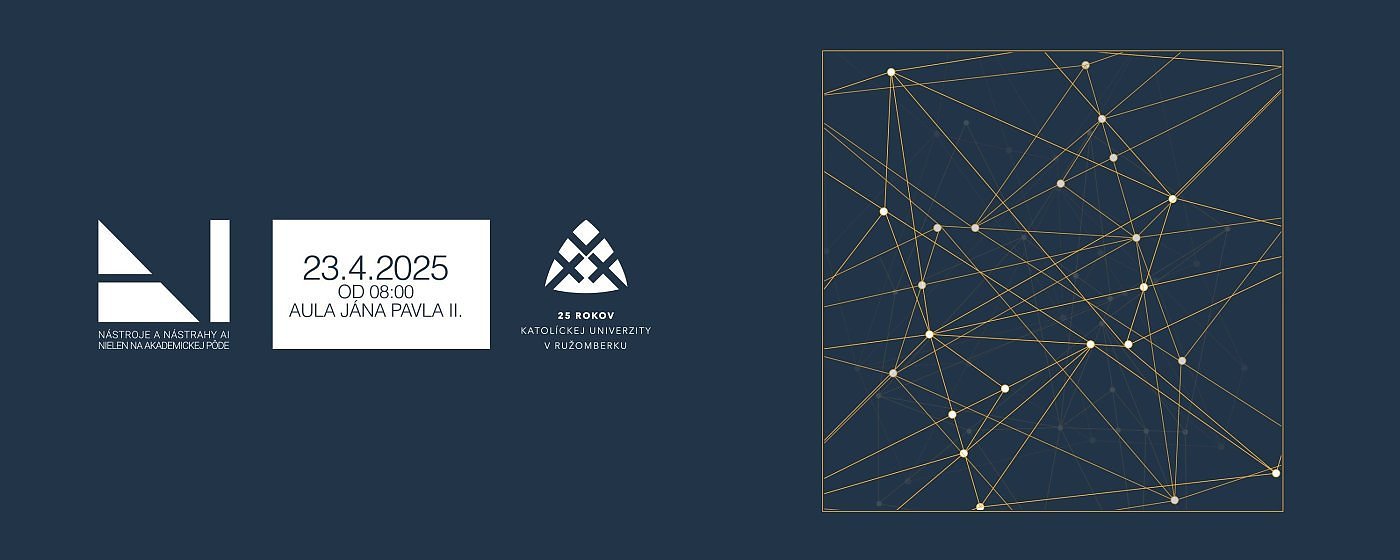AI TOOLS AND TRAPS NOT ONLY IN ACADEMIC FIELD

The aim of the event was to inform the participants about the practical applications of artificial intelligence, as well as to explain its technological foundations. At the same time, the focus was on the pitfalls associated with its use in solving scientific research tasks, as well as the ethical and moral problems of its everyday use. The Programme was built around three lectures, including two expert online inputs. The final session was a discussion on "Quo Vadis AI ?".
Program
08:00 – 08:05 Welcoming guests and participants by the moderator
08:05 – 08:15 Opening of the day by the Rector of KU
08:15 – 09:00 How far does AI reach
a) Short introduction CERN
b) Short introduction LF UK in Bratislava
09:00 – 10:00 AI in science and research
10:00 – 10:15 Break
10:15 – 11:15 Ethical challenges and moral aspects of AI
11:15 – 12:00 Discussion on the topic: Quo Vadis AI?
HOW FAR DOES AI REACH ? - MÁRIO MINAROVSKÝ
Artificial intelligence is no longer just a chatbot answering questions. Its use extends to various areas of science, research and practice - from the analysis of experimental data, through automated evaluation of measurement results, to medicine. It helps with the analysis of medical images in everyday practice, or an intelligent chatbot can order patients to the clinic.
The lecture will also include two short presentations. In the first, nuclear physicist Peter Chochula will briefly explain how artificial intelligence helps solve tasks at CERN. In the second, dentist Andrej Thurzo will explain the practical benefits of modeling patients' dental restorations directly in the office.
The lecture aims to introduce the wide possibilities of AI, its impact on both the academic and practical environment, and the challenges it brings with it.
Link: https://www.youtube.com/watch?v=CeWZYnWScMs
AI IN SCIENCE AND RESEARCH - MILAN PIKULA
The topic of "artificial intelligence" exploded so loudly a few years ago that we can't see the essence through the noise, chaos and smoke. What is what is a person able to declare to be artificial intelligence today? What are its flaws, problems, security implications? How to use it correctly and when not to use it at all?
We looked at the real use of artificial intelligence in science and research - from data processing and automated analysis to ethical dilemmas and limits of current models.
We discussed how artificial intelligence can accelerate discoveries, but also the risks of misinterpreting results or the possibility of data manipulation. We also focused on practical examples, advantages and pitfalls of implementation in academic environments and industrial research.
Link: https://www.youtube.com/watch?v=TAXOQ76i9gE
ETHICAL CHALLENGES AND MORAL ASPECTS OF AI - PETER ŠANTAVÝ
The phenomenon of artificial intelligence has long since transcended the scope of an attractive technology narrowly applicable to specific academic, military or industrial applications. In the words of a modern technocrat – it is an emergent and disruptive technology, i.e. a new and developing technology that replaces and abolishes previous technologies with the ability to completely change the way society functions, while having the potential to move civilization forward. However, what the technocrat does not say – it is a technology that, if not mastered, has the potential to lead us to really big problems.
The paper pointed out some risks and challenges in the technological field and their sociological, psychological and civilizational consequences with an emphasis on the basic ethical framework of trustworthy artificial intelligence systems and their responsible use.
Link: https://www.youtube.com/watch?v=-uAagf4CPgY
QUO VADIS, AI? – DISCUSSION
How quickly is AI entering our lives? How has AI developed into its current form in the eyes of the conference participants? Is the time when we can continue to ignore the existence of AI gone forever? How is AI entering the academic environment?
We sought answers to these and many other questions in the discussion Quo vadis, AI, which concluded the conference Tools and Pitfalls of AI Not Only in Academia.
